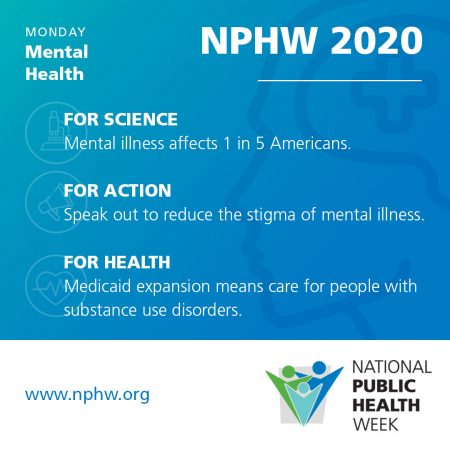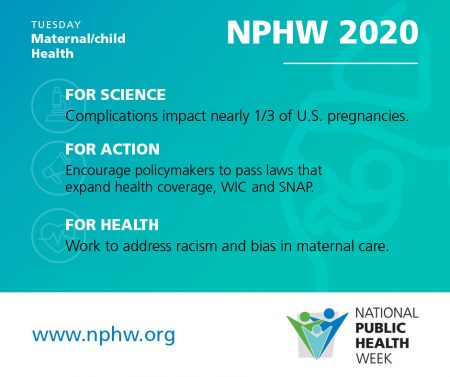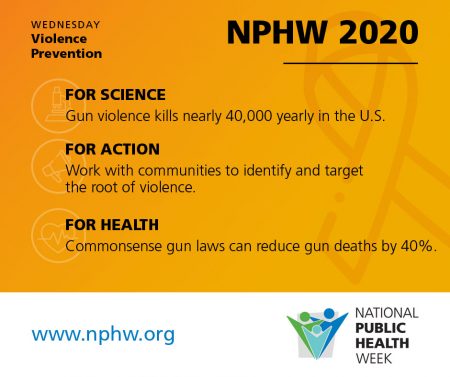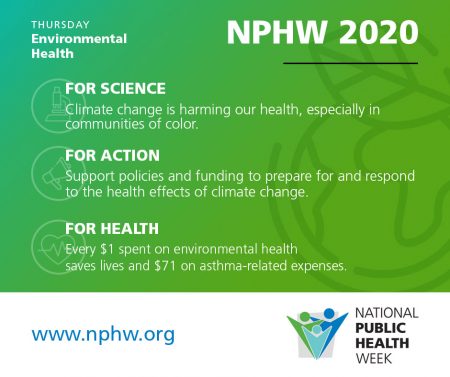National Public Health Week

April 6th marks the beginning of National Public Health Week!
Naugatuck Valley Health District is a nationally accredited local health entity that provides public health services to Ansonia, Beacon Falls, Derby, Naugatuck, Seymour and Shelton.
Our 3 main divisions include: Administration & Grants, Community Health Services, and Environmental Health Services. All 3 divisions are still operating while also performing COVID-19 response activities.
To contact the NVHD, please call 203-881-3255 x0 or visit us online at www.nvhd.org!
Be sure to like and follow us on social media for facts related to the daily topics!
FACEBOOK | TWITTER | INSTAGRAM | LINKEDIN
NPHW 2020 Topics:
Monday: Mental Health — advocate for and promote emotional well-being

Are you experiencing stress and/or anxiety related to COVID-19? Please visit our webpage of behavioral health resources for you, your family, or loved ones.
“10% of Valley adults reported being mostly or completely anxious and 9%t reported feeling down, depressed, or hopeless more than half of the days during the two weeks prior to the 2018 DataHaven Community Wellbeing Survey; the respective rates were even higher for younger adults. The Mobile Crisis Intervention Services for children and adolescents experiencing a behavioral or mental health need or crisis, accessed through 2-1-1, received 571 calls from Valley towns in fiscal year 2018. Additionally, the Valley continues to be impacted by the opioids crisis and experiences a high number of non-fatal and fatal overdoses. Improving the emotional and social wellbeing of the Valley residents through access to care and community resources is important to the Valley community.” – Valley Community Health Improvement Plan
Tuesday: Maternal and Child Health — ensure the health of mothers and babies throughout the lifespan

For pregnancy and breastfeeding information related to COVID-19, please visit the CDC’s webpage: https://www.cdc.gov/coronavirus/2019-ncov/need-extra-precautions/pregnancy-breastfeeding.html
Check out our Community Health Improvement Plan to learn more about the Valley’s Maternal and Child Health Coalition work!
Wednesday: Violence Prevention — reduce personal and community violence to improve health

“Intentional injuries, such as those related to violence (domestic violence and otherwise) and suicide attempts, are troubling. Within the Valley, hospital encounters related to violence from 2015 to 2017 were below the statewide rate and declining, but disparities exist between towns. The rate in Ansonia stands out, while Derby’s rate mirrors the statewide rate—the remaining Valley towns exhibit rates well below the state. Hospital encounters related to suicide and self-harm in the Valley were well below the state overall.” – 2019 Valley Index Report (pg 33).
Are you feeling unsafe at home? Our community partners BHcare run a program called The Umbrella Center for Domestic Violence Services (UCDVS). It is dedicated to increasing awareness of domestic violence and its effect on the community, empowering those victimized by providing advocacy and safe and effective services, and to working for social change to eliminate domestic violence. All services offered are free of charge and confidential. Services support 170 different languages 24 hours a day, 7 days a week. The UCDVS Crisis Hotline numbers are (203) 736-9944 and (203) 789-8104. Toll-free 1-888-774-2900
Thursday: Environmental Health — help protect and maintain a healthy planet

“The air we breathe, the water we drink, the food we eat and the condition of our homes all affect our health. Exposure to air pollution worsens serious respiratory conditions such as asthma, and millions of Americans are at risk for unsafe drinking water. Communities of color often face greater community health risks — such as poorer air quality— and fewer health-boosting opportunities — such as safe places to walk— than their white counterparts. Climate change, which is already seriously affecting people’s health and well-being, causes more frequent and extreme natural disasters, such as hurricanes, flooding and drought. It degrades food security and water and air quality and heightens the risks of vector-borne diseases, such as West Nile virus and Lyme disease. Like so many health threats, climate change also disproportionately affects already-vulnerable populations, such as the elderly, young children, people living in poverty and people with chronic diseases.” – www.apha.org
“According to the Connecticut Department of Public Health’s School-Based Asthma Surveillance Report, levels of childhood asthma were generally lower in Valley public schools than statewide; however, Ansonia and Derby school districts were above the statewide range.” – 2019 Valley Community Index Report.
Head over to our Environmental Health Services page for a list of other program work and services.
Friday: Education — advocate for quality education and schools
Saturday: Healthy Housing — ensure access to affordable and safe housing
Sunday: Economics — advocate for economic empowerment as the key to a healthy life
Go Back